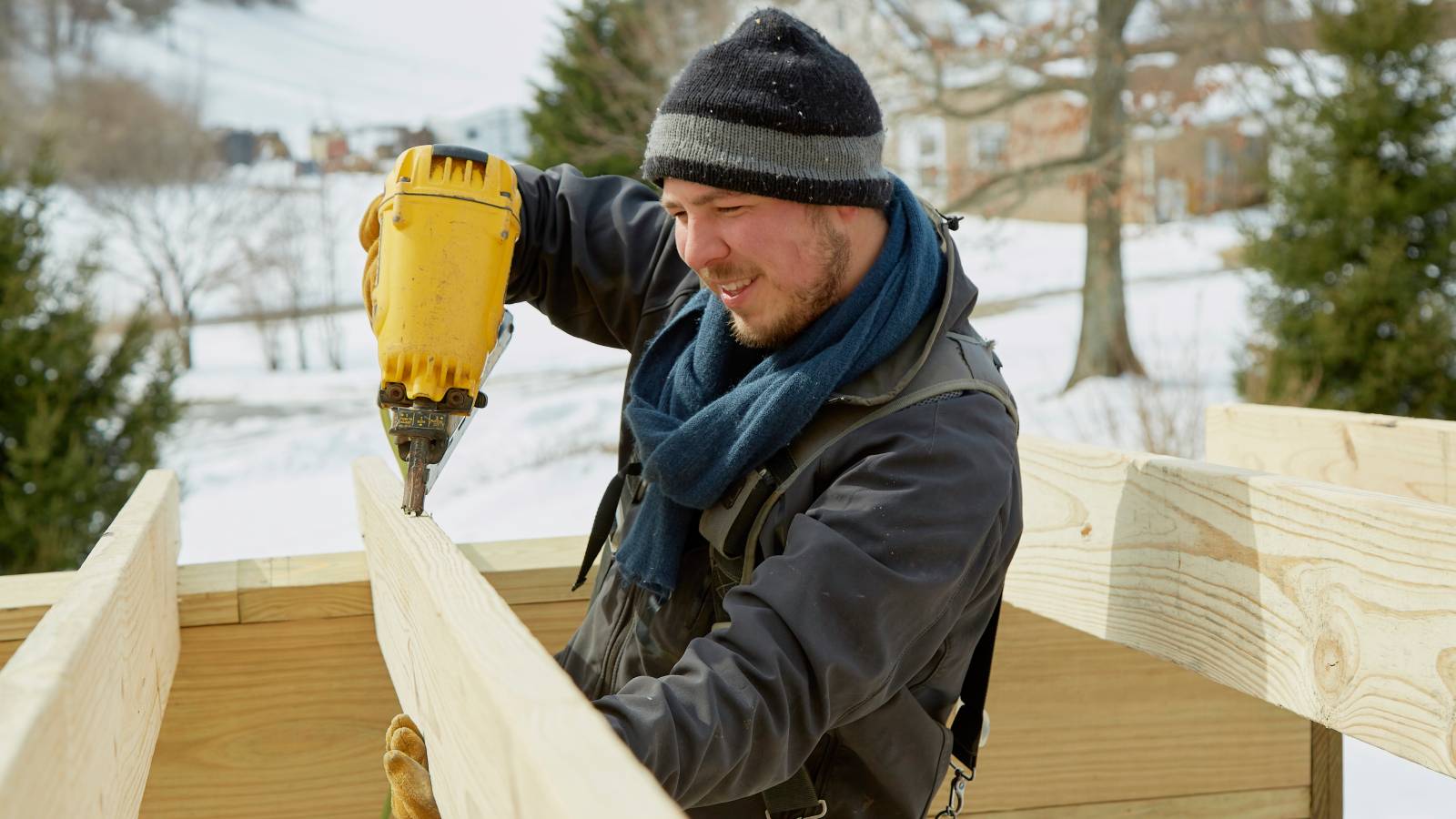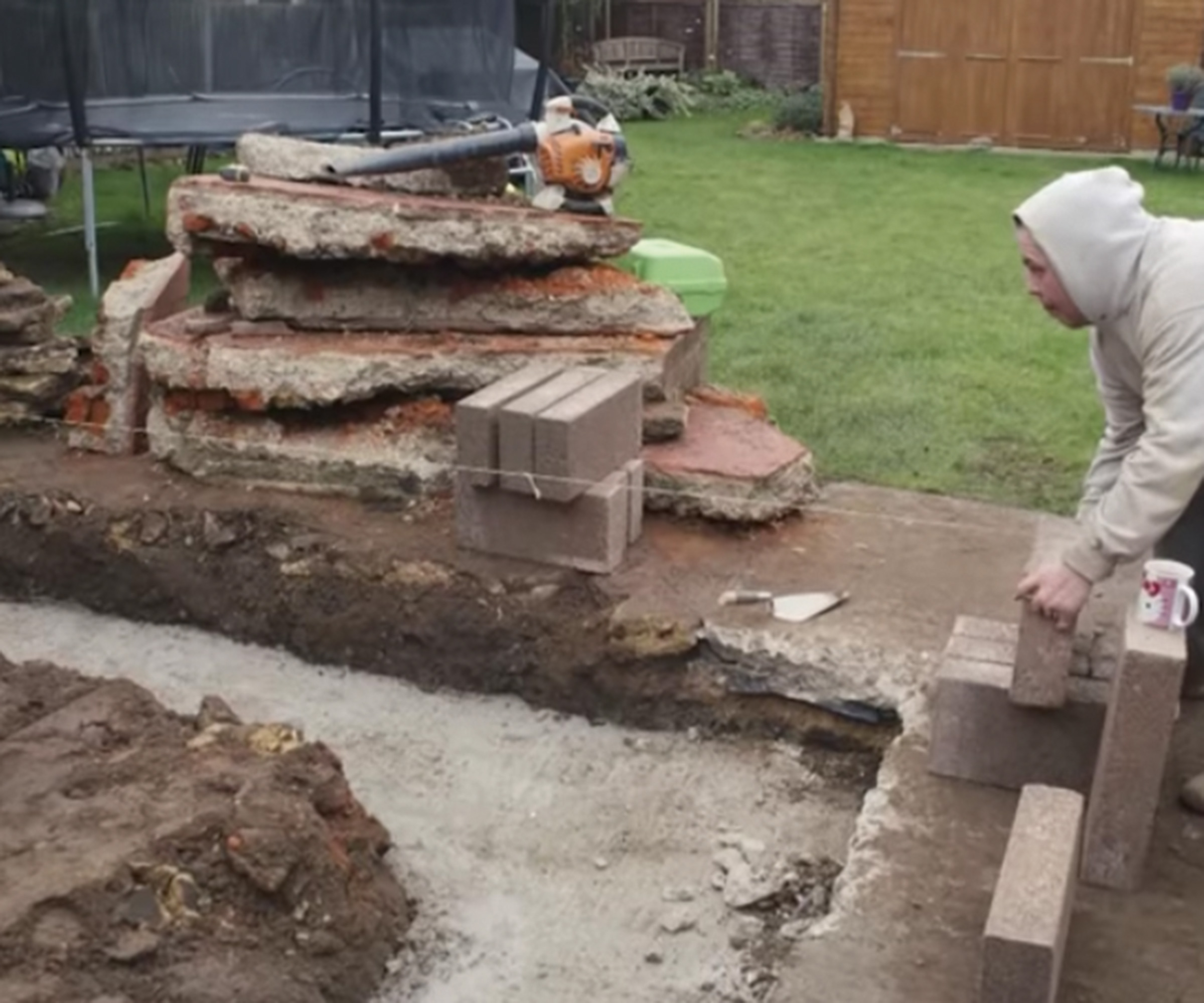How to avoid sleeping in your ski clothes – 6 essential tips for building an extension through winter
Building an extension through winter isn't for the faint-hearted. Follow these six essential tips to help survive the bad weather and mitigate delays

Bring your dream home to life with expert advice, how to guides and design inspiration. Sign up for our newsletter and get two free tickets to a Homebuilding & Renovating Show near you.
You are now subscribed
Your newsletter sign-up was successful
Building an extension at the best of times can be stressful. Building an extension through winter can add delays, costs and strain to your project. Whether it's snow, ice, rain or wind the winter weather can have a fundamental impact on how smoothly your extension goes to plan.
The good news is, while you can't control the weather, being prepared for all eventualities can help mitigate some of the risks, and help to reduce the consequences when things don't go quite as you'd hoped.
So what can you do to make it an easier experience if you're building an extension in winter? I asked established builder, Charlie Avara, founder of Build by Charlie and some of the Homebuilding editorial team, all whom have experience in renovating or extending homes for their top tips to make the process less painful. Here's what they recommend.

After a very successful career as MD of a design and build company, Charlie now runs her own domestic contracting business, BUILD by Charlie. With over 15 years in the industry Charlie has built up a wealth of knowledge on all things renovating and remodelling with a proven track record of delivering on projects ranging from the ultra modern, through to period properties.
Pros and cons of building an extension in winter
Although building an extension in winter is usually problematic, if you're brave enough to withstand everything the season can throw at you, it can have its benefits.
"One advantage of carrying out building works in winter can be that it is generally a slower time of year for the trade," says Charlie Avara, "as fewer people are inclined to undertake works that might mean living with the cold.
"This can mean that even highly sought after contractors have shorter lead times for getting projects under way."
However, she also warns that building your house extension ideas through the winter comes with some inherent issues that simply can't be ignored.
Bring your dream home to life with expert advice, how to guides and design inspiration. Sign up for our newsletter and get two free tickets to a Homebuilding & Renovating Show near you.
"Depending on the works being undertaken it can mean that you might be without heat or hot water, or have an opening in your home during cold or wet weather. If it's only for a day or two you might choose to stay with friends or family, but if this lasts a week or more, you might need to find a hotel or AirBnb, which can add to the cost of your project," she notes.
"Additionally some materials can be harder to work with in cold weather," says Charlie. "The concrete for your extension foundations for example should not be used when temperatures are expected to be below three degrees before it has set. At low temperatures the mortar and brick may not bond effectively, leaving the works at a greater risk of suffering problems."
And it's not just the weather than can cause a problem.
"Fewer daylight hours can reduce the amount of time that it is feasible to work on site, or mean that you might need to provide extra lighting on site to allow your team to work safely," she adds.

6 essential tips for building an extension in winter
1. Choose your start date carefully
Although it can be easy to fall into the trap of assuming January is the best time to start anything new, be it diet, exercise or abstaining from alcohol, it's not always the best time to start a new extension.
"Starting an extension in winter is likely to be more challenging than finishing one in the winter," says Charlie Avara. "Dealing with frozen ground, cold mortar and challenging conditions on site as a result of the weather, are much more out of our control.
"Groundworks, the starting point of any build project, can be a particularly challenging aspect of building an extension to start in the winter," she explains. "The ground could be too hard to excavate and it might be too cold to pour the concrete. This can cause delays to creating footings and foundations that can last as long as the unsuitable weather does."
Of course, when you start may also be dictated by the projected length of your project and it can often be this that influences when you start on site.
Hoping to be 'finished for summer', or 'in for Christmas' are common refrains heard from anyone embarking on a project. But, the reality is, things aren't always set in stone which leads us nicely onto tip number two – being sensible with your extension planner.
2. Set a realistic timeline
If you do decide to start building an extension in winter, it's wise to think of your timeline in the same way as your budget – add a contingency in terms of time.
"Set a realistic timeline and do not put yourself under time pressure," recommends Charlie Avara. "It is reasonable to expect that sometime could be lost to poor weather during the winter. By setting yourself an inflexible deadline you could be creating a perfect storm."
Based on my own experiences, I can confirm Charlie's advice is spot on. I started a project in January with an estimated completion date of November. Did it go to plan? No. Fast forward to a few days before Christmas and it was an overwhelming flurry of tradespeople in a last minute attempt to be 'in for Christmas'.
Why the delay? Bad weather at the start of the project in January set us back several weeks, along with the groundworks taking longer than we'd been able to predict. Subsequently although in some ways it was rewarding to eat Christmas dinner in our new home, the exhaustion and stress made the day less enjoyable and in hindsight, waiting another few weeks would have been more sensible.
3. Build winter delays into your budget
Of course, with any changes to your timeline comes the risk of extra costs. It's not just rising material prices that can eat up your contingency budget which is why building an extension in winter means making provision for delays too.
"Work with your contractor to build some contingency into your budget and really understand their quotation for the how much an extension will cost to build," says Charlie Avara.
"When working with clients I always advise a contingency as unfortunately we do not have a crystal ball to predict any potential issues, especially when working through winter.
"In an ideal world we won’t have to use this, but if for example heaters are required to dry work due to excessively wet weather, you have the option to do this rather than an unexpected cost or delay derailing the larger project and the bigger picture."

4. Don't replace your heating system before winter if living on site
If your extension involves any changes to your existing heating or electrics and you're remaining on site throughout the project, think very carefully about when the work will take place is the advice from Amy Willis, Homebuilding & Renovating's website editor.
"If you plan on living on site, never replace any part of your heating system just before winter rolls in," she stresses. "I made this mistake myself once and I spent nearly an entire winter sleeping on an electric blanket in my ski gear.
"Trying to do renovation work when you're cold makes the job unpleasant and much harder," she warns. "Instead, rip out a heating system around Spring time as the months start to warm up."

Amy spent over a decade in London editing and writing for The Daily Telegraph, MailOnline, and Metro.co.uk before moving to East Anglia where she began renovating a period property in rural Suffolk

5. Time your window install carefully
In my experience, if something is going to cause delays when building an extension – or any building project for that matter, it's the glazing. But, even if it all goes to plan, timing is everything when it comes to when you remove your old windows in preparation for new ones.
Laura Crombie, Homebuilding & Renovating's content director and experienced home renovator had her own problematic experience with glazing when working on her current project.
"If building an extension in winter, I'd certainly recommend you don't create new openings for windows and then have the house boarded up for weeks when the frost arrives," she says. "We were living in ours for three weeks with a two-year-old and no windows during November and December. It was a bleak time!"
It can even impact smaller projects unexpectedly, says Claire Lloyd, brand development editor of Homebuilding & Renovating.
"The snowy conditions in November 2024 recently set back a family member’s extension and renovation project," Claire tells me. "The bad weather meant an old window could not be replaced as planned, and this had a knock-on effect; making good and plastering the surrounding walls was also delayed as a result."

Laura has been a homes journalist for more than 17 years. She’s DIY-renovated three properties and written about decorating and design for publications including The Guardian, The Times and The Metro.
6. Delay your external finishing until it's warmer
Even if you're watertight and warm by the time the bad weather comes, building an extension in winter can still impact on your project warn the the team.
"Despite originally planning to apply the external render in January and February," says Laura Cromie, "it turned out to be too cold, meaning we had to wait until the weather was warmer. It may not have held up work inside, but certainly impacted on the completion of the exterior."
"Exterior finishing can be challenging in the winter," agrees Charlie Avara. "Ideally painting needs to take place in warmer weather too," she adds.
FAQs
When is the best time to build an extension?
Although the weather in the UK is often unpredictable, in general, spring is considered the best time to start any building project.
While rain and wind may still make a regular appearance, the ground temperature has generally risen making groundworks easier. Cold snaps are likely to be less severe and unlikely to cause delays.
That said, it's also one of the most popular times and leads you into the busy summer period when delays may be caused by lack of tradespeople rather than weather.
My personal advice that's less about the build and more about you? Although it may seem slightly off-topic, from experience, staying warm on site is also important if you're wondering if you could project manage your home extension. Having built and extended a property through one of the coldest and wettest Welsh winters I can recall, being on site can be challenging if you're not used to working outdoors.
Warm hats, lots of layers, thermals and disposable hand warmers were the only way I survived, and I'd say to anyone planning on building an extension or any type of property through winter – be prepared. After all, when you can only think about how cold or wet you are can lead to rushed decisions which you may come to regret or pay extra for.
And don't for one minute think that your standard dog walking wellies will be sufficient protection for your feet. Warm, sturdy site boots are a must. My favourites? These Rigger boots from Screwfix with a faux fur lining. My toes had never been toastier.

Sarah is Homebuilding & Renovating’s Assistant Editor and joined the team in 2024. An established homes and interiors writer, Sarah has renovated and extended a number of properties, including a listing building and renovation project that featured on Grand Designs. Although she said she would never buy a listed property again, she has recently purchased a Grade II listed apartment. As it had already been professionally renovated, she has instead set her sights on tackling some changes to improve the building’s energy efficiency, as well as adding some personal touches to the interior.
